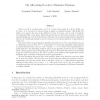Free Online Productivity Tools
i2Speak
i2Symbol
i2OCR
iTex2Img
iWeb2Print
iWeb2Shot
i2Type
iPdf2Split
iPdf2Merge
i2Bopomofo
i2Arabic
i2Style
i2Image
i2PDF
iLatex2Rtf
Sci2ools
FOCS
2009
IEEE
2009
IEEE
On Allocating Goods to Maximize Fairness
Given a set A of m agents and a set I of n items, where agent A ∈ A has utility uA,i for item i ∈ I, our goal is to allocate items to agents to maximize fairness. Specifically, the utility of an agent is the sum of the utilities for items it receives, and we seek to maximize the minimum utility of any agent. While this problem has received much attention recently, its approximability has not been well-understood thus far: the best known approximation algorithm achieves an ˜O( √ m)-approximation, and in contrast, the best known hardness of approximation stands at 2. Our main result is an approximation algorithm that achieves an ˜O(n ) approximation for any = Ω(log log n/ log n) in time nO(1/ ) . In particular, we obtain poly-logarithmic approximation in quasi-polynomial time, and for every constant > 0, we obtain ˜O(n )-approximation in polynomial time. An interesting technical aspect of our algorithm is that we use as a building block a linear program whose integrality ...
Approximation Algorithm | Approximation Stands | FOCS 2009 | Integrality Gaps | Theoretical Computer Science |
Related Content
| Added | 20 May 2010 |
| Updated | 20 May 2010 |
| Type | Conference |
| Year | 2009 |
| Where | FOCS |
| Authors | Deeparnab Chakrabarty, Julia Chuzhoy, Sanjeev Khanna |
Comments (0)

